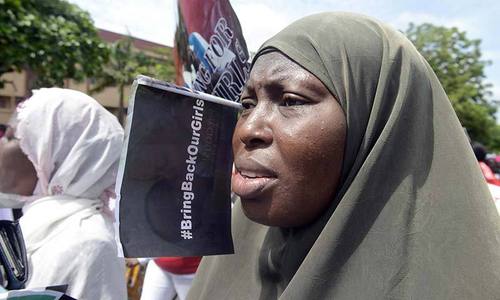Hundreds of girls have refused to return to their school in northeast Nigeria because of security fears following a mass kidnapping by Boko Haram militants, parents and teachers said on Tuesday.
Terrorists stormed the Government Girls Technical College in Dapchi on February 19, seizing 111 schoolgirls in a carbon copy of the abduction in Chibok in 2014 that caused global outrage.
All but six of the Dapchi girls were returned to the school just over a month later. Five died in captivity while the only Christian among them is still being held.
The school re-opened on April 30 but one teacher, who asked not to be identified for fear of official sanctions, said most pupils have stayed away because they were still afraid.
“We have a total student population of 989, and out of that number only 314 have resumed after we reopened. Of the 314 that returned, 299 are writing their final examinations and will be leaving school in July,” he said.
“So, technically, we can say only 15 students have resumed, who will be continuing their education here.”
Bashir Manzo, who headed the abducted girls' parents association, said children were being kept at home because of a lack of security personnel.
“There are only a handful of soldiers and vigilantes guarding the school, not more than 25 in all, a number grossly inadequate to protect our daughters,” he told AFP.
“We believe even the 15 girls that returned will go back home once their seniors finish their examinations and leave.”
The education commissioner for Yobe state, Mohammed Lamin, angrily dismissed parents' concerns and said “everything humanly possible” had been done to make the school safe.
“We deployed soldiers, police, civil defence paramilitary and vigilantes to the school providing security 24 hours,” he said.
“How can they say security is inadequate? Do they have such level of security in their homes?”
Lax security
Security has been an issue in Dapchi since it emerged that soldiers had been withdrawn before the kidnapping and claims that warnings about Boko Haram's arrival went unheeded.
Some children who escaped the abduction vowed never to return.
Another parent, Kachalla Bukar, said there were now even fewer troops in the remote town, which lies some 100 kilometres north of the state capital, Damaturu.
“The route through which the kidnappers came in and out of the town is still without military or police presence,” he said. “This route leads up to Chad.”
The state government's failure to show sympathy and provide moral support to families of the abducted schoolgirls had not inspired confidence, he added.
Nigerian President Muhammadu Buhari had visited the town but as yet, there had been no condolences sent from the state government to the families of the girls who died or support for the remaining girl in captivity, he alleged.
Parents had expected improved security measures, including raising the school's low perimeter wall, said Bukar.
Married off
The Boko Haram conflict has destroyed schools across northeast Nigeria, which had poor levels of education even before the conflict began in 2009, particularly among girls.
Last September, the United Nations children's charity UNICEF said more than 2,295 teachers had been killed and 19,000 displaced while nearly 1,4000 schools have been destroyed.
Manzo said UNICEF secured admission for 20 of the abducted girls into Tulip International College, a Turkish-run private school.
Parents of the other girls were left to try to get them admission into other public secondary schools in the state but without success.
Bukar said parents were losing faith with the authorities.
“This leaves many parents with no option but to marry off their daughters because they have no means of taking them to schools outside the state,” he said “From reports at our disposal six girls have so far being married off because their parents have lost interest in sending them to school,” Manzo said.
Four of the students writing their final examinations who refused to return to the school could also be joining them, he indicated.















































